
BeReal: How Authenticity Turns into Violation of Privacy
The issues with privacy protection are not uncommon when it comes to social media companies. Giants such as Facebook and Twitter have had their fair share of privacy-related scandals, and users are, for the most part, aware of these companies actively gathering and using their data. When it comes to new social media, their reputation does not precede them, as in the case of BeReal, giving the app an advantage of enforcing its own dubious privacy policies and user surveillance.
This article looks at how the new and rising social media platform BeReal structures its app to enforce what is called an expository society through behavior modification and how it plays into societies of control. To answer this, the article will present a walkthrough of the app features and design, as well as analyze the privacy policy and existing literature.
What is BeReal about?
BeReal is a fairly new app, developed in 2020 but gaining viral popularity in early to mid-2022, almost doubling the downloads of another new social media giant, TikTok, in September 2022 (Statista, 2023). The app's concept is rather straightforward, its users select their timezone out of four available options - Americas, Europe, West Asia, and East Asia - and from that point, they will receive a notification at a random time every day. The notification tells the users it is “Time to Be Real” - take a picture of what they are currently doing simultaneously from the back and front camera of their smartphone in a 2-minute time frame. While the users can post their photos after or retake them, the app will show how late they were and how many retakes they took. This way BeReal’s format aims to bring back authenticity to social media posting, as the content cannot be edited or staged, compared to how it is on other popular platforms (Cheong, 2022).
Screenshots showcasing how the app works from BeReal's App Store Page
The app has not been in the spotlight for long, meaning that the existing studies on it are scarce, most of the research on its approach to privacy exists in the form of articles. The consensus of the materials points out how the concept of the application raises quite a few questions about its link to user privacy protection. After all, the randomness and limited time for picture-taking heighten the chances of the user accidentally disclosing private or identifying information in their shot (Avast Blog, 2022).
Other research looks into the app's privacy policy, pointing out some particularly questionable points. The app’s old policy stated that the content posted by their users cannot be copyrighted and they have the right to access and use it without getting additional consent or paying royalties for three decades - whether it would be in promotions or elsewhere (Castro, 2023). This particular part of the policy was removed in 2023, however, the app will retain its users’ data and content "as long as you have an active account or until the Content is deleted by you” (BeReal, 2023).
Multiple research articles about BeReal look into its psychological impact, whether it would be on how it affects the production of online authenticity in adolescents (Neufeld-Wall, 2023) or how it influences well-being and provokes envy (Schötteler & Horneber, 2023). The consensus these studies come to is that the structure and idea behind BeReal affect users’ behaviors. The findings of these researches, together with existing concerns about BeReal’s privacy policies, serve as a background for further investigation into how the app influences user behavior and what role it plays in accommodating expository society and societies of control.
Theory, Terminology & Method
To proceed with further study of the app’s mechanisms it is important to first clarify the terms applied in this article. Expository society, as explained by Harcourt (2015), refers to the state of the public in a digitalized technology-driven world, as the people knowingly compromise their own and each other’s privacy. This creates a state of constant surveillance enforced by regular people, as private data is willfully exposed by themselves for self-affirmation and approval by others. Through such voluntary exhibition of self, the members of society build their online identity, as the companies exploit such user desire to be seen (Harcourt, 2015). Another partially related, term is Deleuze’s (1992) ‘Societies of Control’ - social systems of modern societies which are built on surveillance and networked power structures. In this system, instead of the government being in charge of monitoring its people, the people themselves watch each other.
Behavior modification refers to the practice in the design of social media and applications which influences the way users interact with content, it applies deliberate strategy to raise engagement and promote desired for the platform actions (Ashmore, 2022). This phenomenon can be observed through the app walkthrough method, an analytical approach that will be applied in this article. As described by Light et al. (2018), this method looks at the features and functionality of a software application’s design, such as the graphic design, prompts, and choices provided within the app, to determine how it directs the users to perform certain interactions and generate experiences. This critical analysis method combines technological knowledge with culture studies, showcasing how interactions, including ones that expose user personal information, are prompted through software. This article will, thus, look at the interface and capabilities provided within the BeReal mobile app and analyze the connection between the features and user privacy.
Being Real, FOMO, and Public Judgement
The central feature of BeReal is, of course, posting daily updates together with all the other users in the area at the same time. The app encourages everyday use and promotes interacting routinely. While it allows its users to post their BeReal after the notification of the day comes and before the next one is sent out, you cannot see the content of others until you have posted, only their caption (if they decided to add one) and the blurred picture. Moreover, a fairly new feature that BeReal started offering to those who post on time is being able to share multiple posts a day, showing others what you are doing throughout the day.
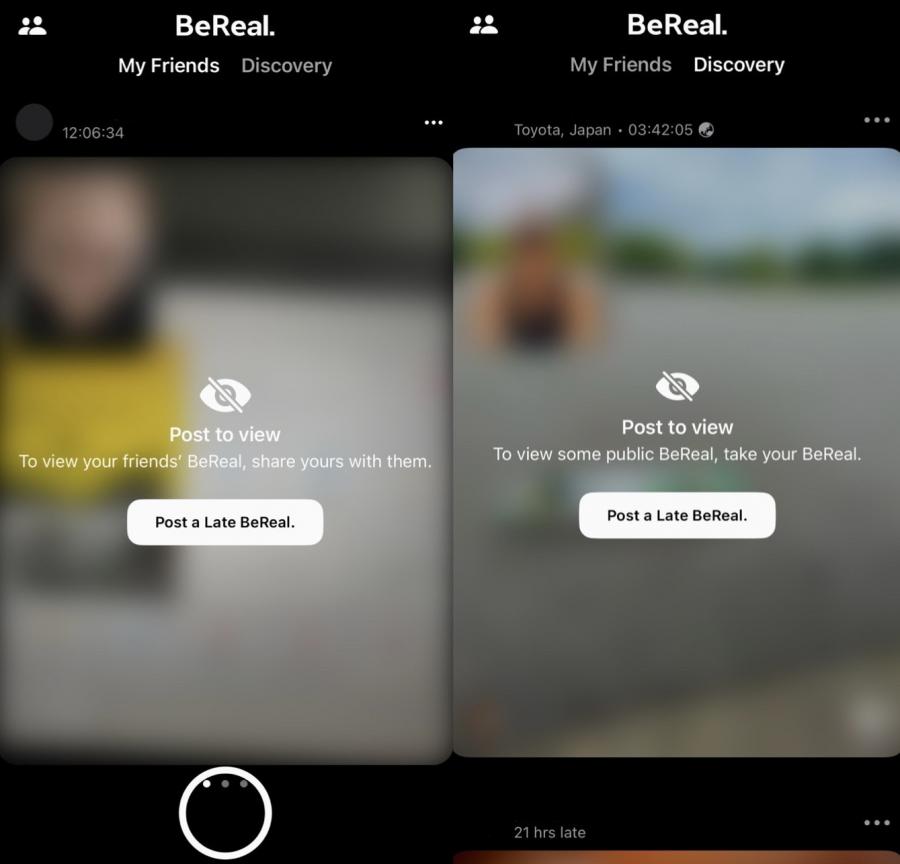
View of 'My Friends' and 'Discovery' feeds before posting
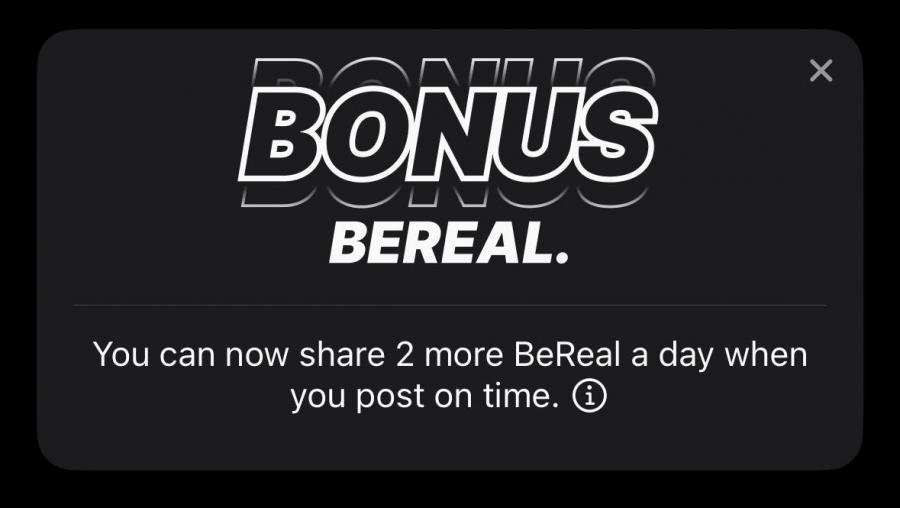
New feature allowing to post multiple times per day
The central feature of BeReal is posting daily updates together with all the other users in the area at the same time
Posting late or retaking your picture multiple times interferes with the app’s ideology of “being your real, most authentic self” and “showing an unedited and unstaged moment of your life”. Thus, this behavior is discouraged through the app’s interface and features. The post will show exactly how late you were to post and how many times you retook your photo. The app also sends out notifications to users’ friends if they post late. Deciding to delete the post twice results in having to wait for the next day’s notification and no longer being able to see what others have shared. In this way, BeReal stimulates the users to post on time, every day and not delete their content unless completely necessary through the fear of missing out (FOMO, in short) and the potential of getting judged by other users.
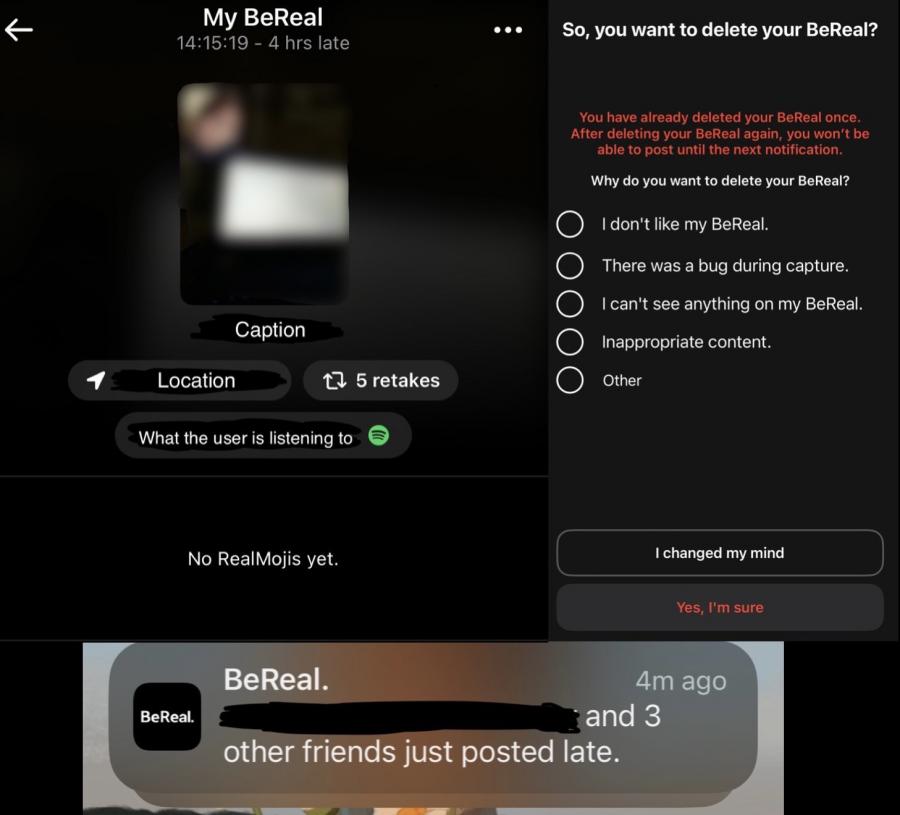
Some features in app's functionality
These features of the app have been developed to modify the behaviors of users in a way that they would regularly interact, fearing to miss posting on time or even just during the day, as there are consequences that follow. Such manipulation is tightly connected with the effects the phenomena of ‘expository society’ and ‘societies of control’ have had on socialization. People are dependent on constantly posting content to form their identity in the social circle, they feel like they are missing out if they do not post or cannot see what others are doing (Harcourt, 2015). On the other hand, they fear the reaction of others to them not posting, posting late, or retaking their photo ‘too much’, as they might face judgment.
Reactions, Comments, and Control
Other than daily posting, BeReal encourages active interaction of the users with the content their friends, or even strangers, post. Firstly, when creating an account on BeReal the user is asked to enter their real name followed by a username and to sync their phone contacts with the app to find other friends who use BeReal. Further on the app does not offer an option to stop syncing phone contacts, unless the user deletes the app and downloads it to trigger the starting sequence again or goes into phone settings to disable it manually. Once contact syncing is enabled, the “Add or search for friends” tab will constantly show BeReal profiles of the people in the user’s phone book they could add, as well as profiles of friends of friends.
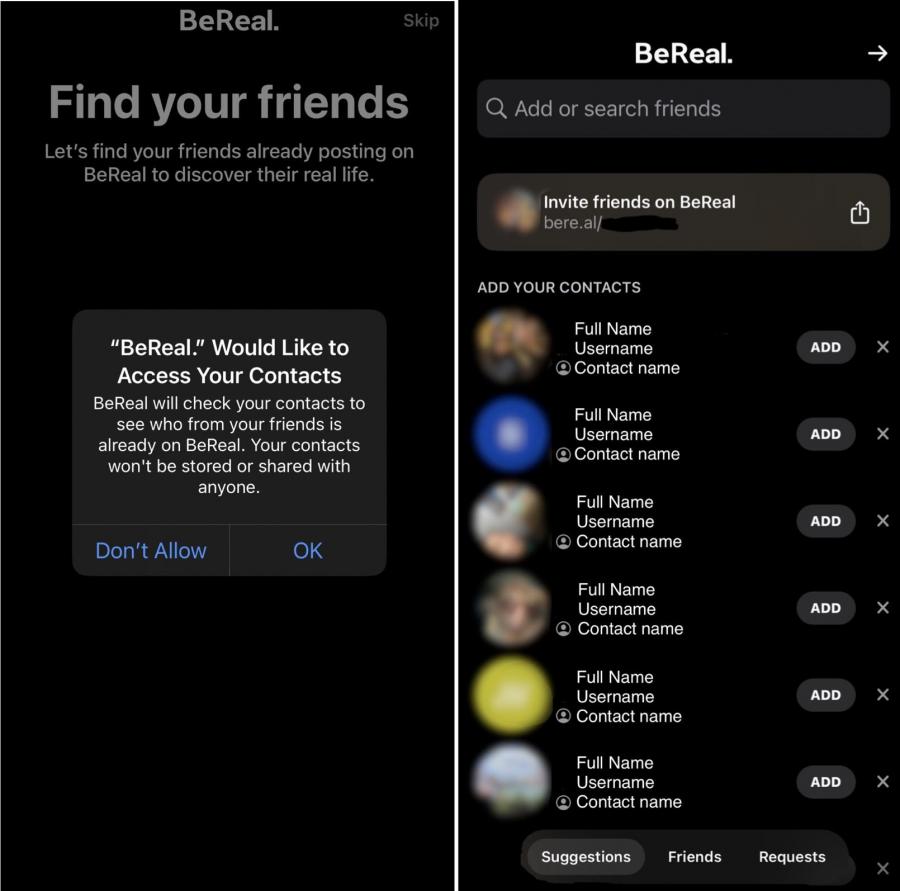
BeReal syncing and showing phone contacts
Once the profile is created and friends are added, the app continues to encourage interactions between posts. There are two main ways of interacting - leaving a ‘RealMoji’ or writing a comment. While the latter is a common feature on other mainstream social media, the former is another ‘authentic’ innovation of BeReal. ‘RealMoji’ are reactions similar to emotes or emojis, but include the face of the user. They can set their picture as one of the pre-established reactions - heart, laughing, smiling, etc. - or capture an ‘Instant Realmoji’ of their current reaction.
The 'RealMoji' feature
BeReal’s in-app prompts constantly encourage these types of interactions among users. If a post does not have 'RealMoji' or comments, the app shows a prompt such as “Wow, it sure is quiet here” or “No comments yet…”. Thus, making sure that your post gets interactions and actively engaging with the content of your friends is promoted through app design. Yet again, BeReal is employing the intricacies of digital socialization to maximize traffic in their app and make the users engaged with their product, modifying behavior. Simultaneously, these practices contribute to the evolution of ‘societies of control’ - actions of the users are actively reacted to and responded to by others, and ‘expository society’ - the users are prompted to post more of and about themselves through interactions on the app.
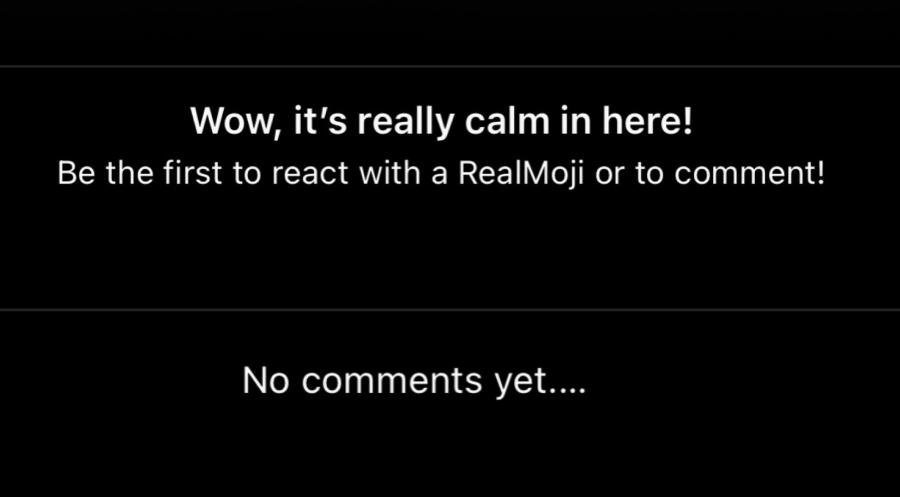
Interface when the post does not have comments/'RealMoji'
Location and Public Surveillance
Together with the time of posting and amount of retakes, BeReal can also track and show the user’s location to others. Moreover, while some smaller details such as comments or retakes are only shown in detailed view, the location is seen on the main feed and can be rather specific - including both the city and the district where the picture was taken. Sharing this information with friends on the application is already a breach of personal privacy, but there is a more concerning twist to this. The feed of BeReal is divided into two categories - ‘My Friends’ and ‘Discovery’. While the former has already been discussed and exclusively contains the content of people the user has befriended, the latter is less straightforward.
When posting their BeReal, a user can choose if they want only their friends or all users to view it. If they decide to go for the second choice, their post will be visible on the Discovery page to everyone who has posted to the platform that day, including those who chose to only share their BeReal with friends. Anyone can react with 'RealMoji' to the posts on Discovery, but not leave comments (BeReal Help Center: Discovery, n.d.). The user can choose if they want a more or less specific location shown on their post - less specific shows the city and country, and more specific also adds the district.
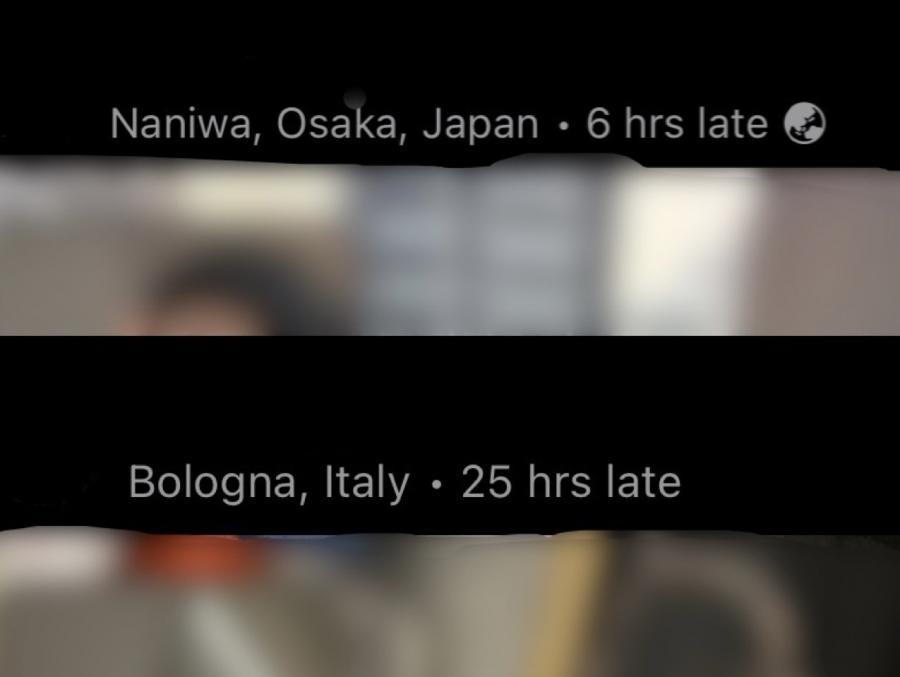
'Precise' and 'Non-precise' user location on Discovery page
This amount of information being disclosed to any user, while presented as a choice made by the ones posting, is still a feature that is concerning to have on the app in the first place. People, conditioned by the structures of expository society, are likely to disregard their privacy for online attention. After all, the post might get more interaction if anyone can react to it, satisfying the craving to be seen. Consequences can get rather serious if the content gets spread outside the platform, being bullied, doxxed, or possibly facing something more serious are all possibilities. This could involve the outing of minorities, such as members of the LGBTQ+ community, in countries with strict laws and punishments for being queer.
The location feature is another example of how BeReal’s strategy utilizes the desire to ‘expose’ oneself to the online public for attention. It plays with the ‘societies of control’ by giving people the power to monitor any user on the platform, giving extensive information about them and, potentially, making them face some sort of punishment for their actions, varying in severity.
The Verdict
BeReal’s functionality, spanning from how the users post, when and what information they are sharing, to how they further interact and get interacted with, is designed to boost the app, but not protect the privacy of the user. While the initial intention of bringing authenticity back into social media is commendable, the way it has been realized is problematic, as seen in this research and all other available literature.
BeReal’s functionality is designed to boost the app, but not protect the privacy of the user
The features that BeReal introduces in their app, while almost exclusively presented as optional, are still designed to manipulate the way the users interact and are both enabling and contributing to some of the raised theoretical phenomena. The privacy of the users is compromised by the app to raise engagement and result in bigger profits, as the app seamlessly prompts the users to expose more of themselves through behavior modification which plays in with the already existing structure of expository society. These features promote inter-user surveillance and give the audience control, participating in the grander shaping of societies of control. Overall, the research presents how seemingly small design and feature choices can have a grand impact on both the personal privacy of each user and the grander inner workings of the public in the digital age.
References
Ashmore, D. (2022, February 16). Social Media, Disinformation and Behaviour Modification. Centuria Study Assoc.
Avast Blog. (2022, October 6). BeReal has some major privacy issues - Security Boulevard. Security Boulevard. Retrieved June 1, 2023.
BeReal. (2023, May 25). BeReal: Privacy Policy. Retrieved June 1, 2023.
BeReal Help Center: Discovery. (n.d.). BeReal Help Center. Retrieved June 4, 2023.
Castro, C. (2023, April 28). BeReal’s policy update isn’t really fixing its privacy issues. TechRadar. Retrieved June 1, 2023.
Cheong, C. (2022, August 2). I tried BeReal, the buzzy photo-sharing app trying to stop people using filters, and after 7 days I was hooked. Insider. Retrieved June 1, 2023.
Joe, C. (2023, February 1). Is BeReal safe? Here’s what you need to know. Android Authority. Retrieved June 1, 2023.
Light, B., Burgess, J., & Duguay, S. (2018). The walkthrough method: An approach to the study of apps. New Media & Society, 20(3), 881–900.
Neufeld-Wall, M. E. (2023). Being Real: Gen-Z, Self-Presentation, and Authenticity on Social Media.
Schötteler, S., & Horneber, D. (2023). Is Keeping It Real Enough? How Perceived Content Authenticity and Self-Esteem Influence Envy on Social Networking Sites.
Statista. (2023, May 31). Leading iPhone apps worldwide 2022, by downloads.